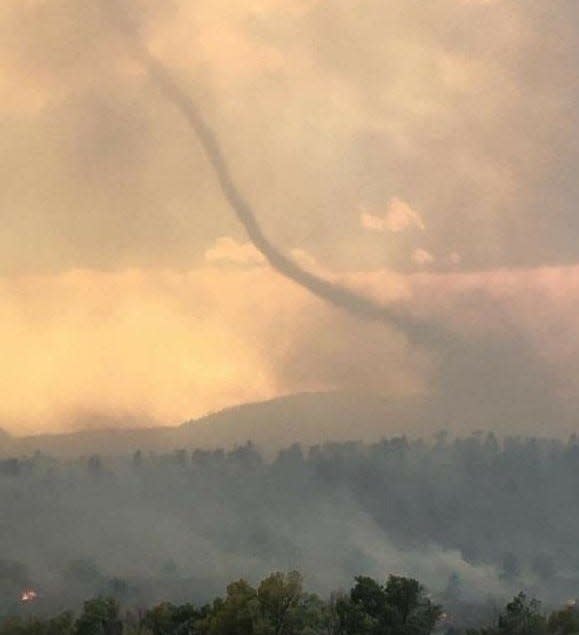Firefighters brave 'really tough' conditions at Cameron Peak Fire, the largest wildfire in Colorado history
The largest wildfire in Colorado history continued to rage on Wednesday, and a red flag warning through Thursday morning was expected to complicate firefighters' battle against the Cameron Peak Fire.
The forecast called for winds of nearly 60 mph Wednesday night over the western portions of the fire, according to fire officials, before cold and windy weather with the possibility of snow moves into the area later Thursday into early Friday.
"We are looking at another critical fire weather day like last Wednesday and Friday,'' Paul Delmerico, the fire's operations section chief, said during a video update. "These conditions are really tough for firefighters and if the fire picks up, we will move those folks into safe places.''
The Cameron Peak Fire grew by nearly 70,000 acres Friday through Sunday as firefighters faced wind gusts of more than 70 mph and a rare smokenado that was photographed by at least one local resident. By Wednesday night, the fire had grown to more than 206,000 acres.

The fire began Aug. 13 on the Arapaho and Roosevelt National Forests near Cameron Pass and Chambers Lake. It was 55% contained as of Wednesday night. The cause is still unknown.
Colorado Fire Prevention & Control tweeted a video on Sunday showing firefighters bracing against wind with flames in the background.
A photo taken by Masonville resident Lorri Provow showed a smokenado in the air, which she said lasted only for a few minutes.
A smokenado is similar to a smoke tornado, firenado, fire whirl or fire devil.
This video gives a quick look into the types of wind conditions us and other firefighters on Cameron Peak experienced and have been experiencing over the duration of the #cameronpeakfire #cofire pic.twitter.com/8WDfE1reTc
— COFirePrev&Control (@COStateFire) October 19, 2020
Greg Hansen, a meteorologist for the National Weather Service in Boulder, Colorado, said the condition is caused when ash and smoke are quickly uplifted by an intense updraft created over hot spots of a fire.
"They are similar to a land spout tornado where existing wind shear causes an updraft with the building of a thunderstorm,'' he told the Fort Collins Coloradoan, part of the USA TODAY Network. "In this case, the rising comes from the heat of the fire.''
Another of the 11 wildfires burning in Colorado forced the mandatory evacuation on Wednesday night of Grand Lake, a town of about 500 people located about 100 miles northwest of Denver.
The East Troublesome Fire was "growing faster than we can catch it right," Incident Commander Jake Winfield warned during a Wednesday night video briefing. The fire had torched about 20,000 acres and was just 10% contained as it surged toward Grand Lake.
Contributing: Miles Blumhardt, Fort Collins (Colo.) Coloradoan
This article originally appeared on USA TODAY: Cameron Peak Fire in Colorado spawns smokenado, grows over 200K acres
